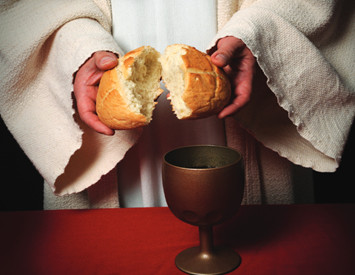3rd Sunday of Easter - Follower... Witness... Disciple
 The Easter story is a powerful one and yet each of the four gospels has a slightly different twist in the telling. The Gospel of Matthew recounts Jesus' appearance to Mary of Magdala and the "other Mary." Mark and John speak only of Mary of Magdala. In all of the accounts it is only later that the Risen Lord reveals himself to others.
The Easter story is a powerful one and yet each of the four gospels has a slightly different twist in the telling. The Gospel of Matthew recounts Jesus' appearance to Mary of Magdala and the "other Mary." Mark and John speak only of Mary of Magdala. In all of the accounts it is only later that the Risen Lord reveals himself to others.
At dawn, on that "first day of the week," the Risen Lord shocks his followers, challenges their faith, and they are overcome by their amazement and joy. Now they become more attentive; they begin to move forward from simply being "followers." They have witnessed, and can now be called "disciples." For that is what they are, they are listeners, learners, beginners. And one cannot become a "disciple" unless one listens and learns. He is risen from the dead and now they need to start all over again.
Like the other Gospel accounts, Luke focuses on the first day of the week and he too features the empty tomb. But Luke's account is much more low-key. He was writing for a Christian community about 50 years after the Easter event. His audience is a long way from Jesus’ time and they might ask, as we might: “How is the risen Christ in our midst now? Where shall we look for and find him?”
Luke’s response to such faith questions is his description of Christ’s appearance in a setting that he structures like a Eucharistic liturgy, as it might have been celebrated by the early Christian communities.
The story opens with two of Jesus' followers, confused and disappointed about the events of His’ life and death. “We were hoping that…,” they tell the stranger who has joined them on the road. Things had not turned out the way they had hoped. Things seldom do...
But then the story begins to move quickly. They become fascinated with a stranger who they happened to meet on the road. They follow him and listen. Their hearts begin "to burn with desire" when he breaks open the Scriptures, enabling them to understand God’s plan in what had just happened. And their eyes are opened when, at table with him, they begin to witness the risen Lord in the breaking of the bread.
What about us? We don’t get to have the extraordinary appearances of Christ that the disciples in the upper room experienced. His presence in our lives is not preceded by beings dressed in robes of dazzling white. Nor does He appear to us as he did to Thomas, inviting us to touch his wounds.
But he does accompany us along the road... What fills us with joy and gratitude is Jesus’ presence with us - in one another, in the breaking open of the Word and in the breaking of the bread.
Still, there are questions. How can this be when, in the midst of global quarantine, we are physically and psychologically isolated from one another and our communities? How do we "break bread together" when now almost of us are experiencing livestreamed liturgies and Sunday without Eucharist? We live in a shattered world, in fragile health, threatened by a new enemy, an invisible enemy. We know our lives have changed and things can never be the same... normal will never be normal again.
So how do we move from follower, to witness, to disciple?
The message of Easter remains the only constant - and perhaps it is more clearly proclaimed now than ever before. We may not be able to share the bread and cup as the disciples did at the Last Supper; we cannot, at this moment, gather around the table with the Risen Lord and break bread with him and with one another. Still, the Eucharist itself is not confined to the tabernacle, or to the time we set aside for liturgy.
The clue was given us a long time ago: "Do this memory of me..." This is how we become Eucharist to one another. This is how we become witnesses to the Gospel message: by listening to the Word of God, by living changed lives, by voicing our faith and by becoming the Risen Lord for one another. Our world needs such witnesses especially today.
What we have now is something wonderful and life altering, and Jesus is just as present to us now as he was in the upper room and to the Emmaus travelers. He reminds us that he is the same, yet there is something very different about him. What he did for the those on the road to Emmaus he does again. This is how our hearts can burn with excitement within us.
St. Francis of Assisi used to say to his followers, "Let us begin again to serve the Lord God, for up to now we have done nothing." It is never too late to start over again, for we too, like the first disciples, have been guilty of missing the mark - of being way off track. Yet, the final words of today's Gospel are aimed at no one other than ourselves: we are “the witnesses of these things.”
For us, this is the "first day of the week." Let us then listen, learn and begin anew so that we may be effective witnesses to the presence of the Risen Lord in our world.